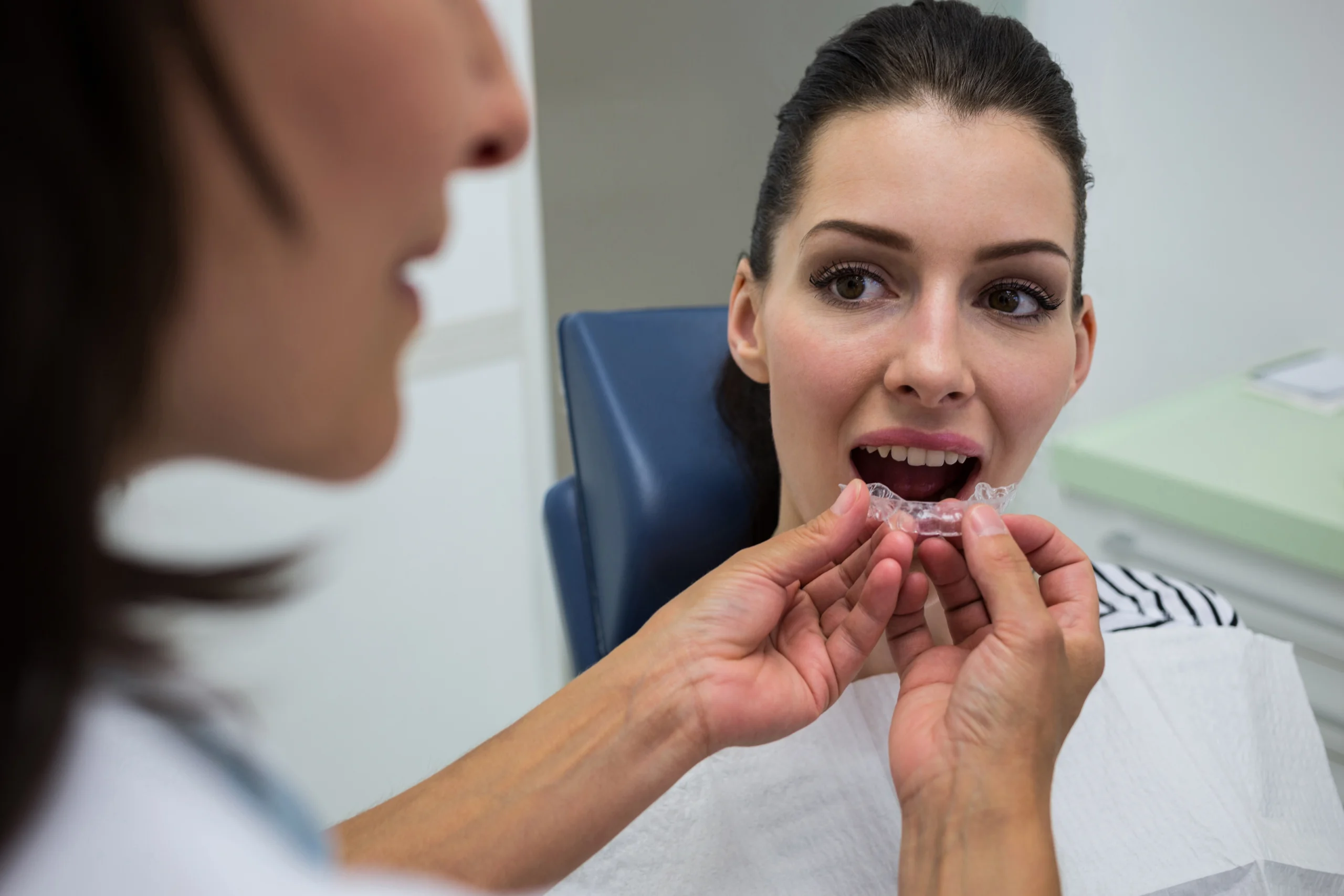Teeth grinding, or bruxism, is a common issue that often occurs at night, leading to tooth damage, jaw pain, and headaches. While it’s not always easy to recognise, the effects of grinding can be serious if left untreated. Fortunately, there are several strategies to help you stop grinding your teeth, particularly at night. This guide provides practical solutions, from improving sleep hygiene to managing stress and using protective mouthguards, to help you avoid grinding your teeth at night and protect your oral health.
What Is Teeth Grinding (Bruxism)?
Teeth grinding (bruxism) refers to the involuntary clenching or grinding of teeth. It is commonly associated with stress, sleep disturbances, or even misaligned teeth. Bruxism typically occurs during sleep, making it difficult to detect, but it can also occur while awake. Although it is often a subconscious behaviour, the damage it causes can be very real, leading to a range of oral health issues such as tooth wear, jaw pain, and even tooth loss.
Symptoms of Teeth Grinding
It’s not always easy to recognise when you’re grinding your teeth, especially since it often happens during sleep. However, several telltale signs and symptoms can indicate bruxism:
- Worn or Flattened Teeth: The constant grinding of teeth can result in visible wear and tear, including chipped or flattened teeth.
- Jaw Pain or Soreness: One of the most common symptoms, this occurs from the pressure placed on the jaw muscles while grinding.
- Headaches: Bruxism can lead to tension headaches, particularly in the temples and around the forehead.
- Earaches: Grinding your teeth can sometimes lead to ear discomfort or a feeling of fullness, as the jaw muscles are closely linked to the ear.
- Facial Pain or Stiffness: Jaw and facial muscles can become sore or stiff, making it difficult to open your mouth fully.
- Disturbed Sleep: Grinding can lead to restless sleep, causing both you and your partner to experience disrupted rest.
Common Causes of Teeth Grinding
Teeth grinding can be triggered by a variety of factors. Understanding what contributes to this habit is the first step in finding an effective solution.
1. Stress and Anxiety
Stress is one of the most significant triggers for teeth grinding, with many individuals unknowingly clenching or grinding their teeth during periods of anxiety or stress. This often happens unconsciously, particularly while sleeping, but it can also occur during the day.
2. Sleep Disorders
Conditions such as sleep apnea, where breathing is interrupted during sleep, can also cause bruxism. The jaw may tense up as the body tries to compensate for disrupted breathing, leading to grinding.
3. Misaligned Teeth or Bite Problems
A misaligned bite or uneven teeth can lead to bruxism as the jaw may be forced into unnatural positions. This can cause muscle strain, which in turn leads to teeth grinding.
4. Medications and Substances
Certain medications, especially antidepressants, can have bruxism as a side effect. Additionally, excessive alcohol and caffeine intake can also contribute to teeth grinding.
5. Other Contributing Factors
- Age: Children are particularly prone to bruxism, although this often resolves itself as they grow older.
- Genetics: Bruxism may run in families, suggesting a genetic predisposition.
Diagnosing Teeth Grinding
If you suspect that you are grinding your teeth, it is crucial to consult with a dentist. A dentist will examine your mouth for signs of bruxism, such as tooth wear, jaw tenderness, and other physical symptoms.
The diagnosis process typically involves:
- Physical Examination: Your dentist will check for signs of wear on your teeth and jaw muscles.
- Patient History: You may be asked about your stress levels, lifestyle habits, and any medications you are taking.
- Sleep Study: If sleep apnea or another sleep disorder is suspected, a sleep study may be recommended to monitor your sleep patterns.
Effective Treatments for Teeth Grinding: How to Avoid Grinding Teeth at Night
Once bruxism has been diagnosed, treatment can help reduce symptoms and prevent further damage. Here’s a breakdown of effective treatments for managing teeth grinding, particularly focused on how to avoid grinding teeth at night:
1. Use of Mouthguards or Splints
A custom-fitted mouthguard, also known as an occlusal splint, is one of the most effective treatments for bruxism. These devices are worn at night to protect the teeth from damage. Your dentist can customise a mouthguard to fit your mouth, offering comfort and protection.
- Custom-fitted Mouthguards: Tailored to your specific bite, these mouthguards offer the best protection and comfort.
- Over-the-counter Mouthguards: These are a more affordable option but may not fit as well or provide as much protection as custom-made mouthguards.
2. Stress Management
Managing stress is essential for addressing bruxism, particularly for those whose teeth grinding is linked to anxiety. Incorporating stress reduction techniques into your daily routine can help reduce the frequency and severity of grinding. Here are some strategies that can help:
- Mindfulness and Meditation: Practices like meditation, deep breathing, and mindfulness can help alleviate anxiety and reduce the need to grind your teeth.
- Physical Exercise: Regular exercise can help reduce overall stress levels, improve sleep quality, and strengthen jaw muscles, reducing the likelihood of grinding.
- Yoga: Yoga can also help release muscle tension, including in the jaw area.
3. Lifestyle Modifications to Avoid Teeth Grinding
Adopting a few simple lifestyle changes can reduce bruxism and improve your overall well-being:
- Improve Sleep Hygiene: Regular sleep routines and a calming environment can help reduce the likelihood of grinding. Avoid stimulants such as caffeine and alcohol, especially before bedtime, and ensure that your bedroom is quiet, dark, and cool. It’s also important to establish a consistent sleep schedule and practice relaxation techniques before bed.
- Quit Smoking: Smoking can exacerbate teeth grinding and worsen sleep quality, so quitting smoking is an important step in managing bruxism.
4. Professional Treatments
If your bruxism persists, your dentist may recommend additional treatments:
- Botox Injections: In severe cases, botulinum toxin (Botox) injections can temporarily weaken the muscles responsible for grinding, providing relief.
- Medication: For some individuals, muscle relaxants or antidepressants may be prescribed to help manage bruxism. However, these are typically considered as a last resort when other treatments have not been effective.
Preventing Teeth Grinding: Long-Term Solutions on How to Avoid Grinding Teeth at Night
While treatments can help address the symptoms of bruxism, prevention is key to long-term relief. Here are some proactive steps you can take:
- Regular Stress Reduction: Consistent practices such as yoga, meditation, and exercise can help keep stress at bay, reducing the likelihood of teeth grinding.
- Quality Sleep: Prioritising sleep and establishing good sleep hygiene habits will contribute to better rest and less grinding.
- Avoid Stimulants: Limiting caffeine, alcohol, and nicotine—especially in the evening—can help prevent teeth grinding.
- Consult Professionals Regularly: Keep up with regular dental checkups to monitor for signs of bruxism and discuss any concerns with your dentist.
When to Seek Professional Advice
If you notice signs of bruxism, such as jaw pain, headaches, or worn teeth, it’s essential to consult a dentist. Early intervention can prevent long-term damage and help identify the root cause of your grinding. For severe cases, a referral to a sleep specialist may be necessary to address underlying sleep disorders that could be contributing to bruxism.
Conclusion
Teeth grinding, though common, can have serious effects on both your oral health and overall well-being if left untreated. From mouthguards to stress management techniques and professional treatments, there are many ways to address bruxism. The key is to take proactive steps early on to protect your teeth and manage any underlying causes. By following the practical advice outlined in this guide, including how to avoid grinding your teeth at night, you can stop grinding your teeth and enjoy better oral health and an improved quality of life. If you need more advice or have any dental problems, don’t hesitate to contact us or visit us at Waldron Dental.
References:
https://www.nidcr.nih.gov/health-info/bruxism
https://pmc.ncbi.nlm.nih.gov/articles/PMC7984358/
https://pmc.ncbi.nlm.nih.gov/articles/PMC2878730/













